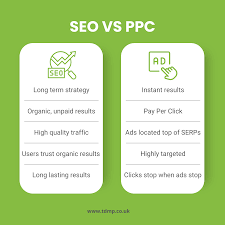
Unlocking the Synergy of Pay Per Click and SEO Strategies
The Power of Pay Per Click (PPC) in SEO Strategies
Pay Per Click (PPC) advertising is a powerful tool that can complement your Search Engine Optimization (SEO) efforts to drive targeted traffic to your website. While SEO focuses on organic search results, PPC allows you to bid on keywords and have your ads displayed at the top of search engine results pages.
Enhancing Visibility
By incorporating PPC into your SEO strategy, you can enhance the visibility of your website by targeting specific keywords that are relevant to your business. This targeted approach ensures that your ads are shown to users who are actively searching for products or services similar to yours, increasing the likelihood of conversion.
Instant Results
One of the key advantages of PPC is its ability to deliver instant results. Unlike SEO, which can take time to see significant improvements in rankings, PPC campaigns can generate immediate traffic to your site once activated. This makes PPC an ideal choice for businesses looking to quickly boost their online presence and attract potential customers.
Measurable ROI
PPC offers a high level of measurability, allowing you to track the performance of your campaigns in real-time. Through analytics tools, you can monitor key metrics such as click-through rates, conversions, and return on investment (ROI). This data-driven approach enables you to make informed decisions and optimise your campaigns for maximum effectiveness.
Complementing SEO Efforts
While SEO is essential for long-term organic growth, integrating PPC into your overall marketing strategy can provide immediate benefits and support your SEO initiatives. By combining both approaches, you can create a comprehensive digital marketing strategy that maximises visibility, drives traffic, and ultimately boosts conversions.
Conclusion
In conclusion, Pay Per Click (PPC) advertising is a valuable asset that can enhance your SEO strategies by providing instant visibility, measurable results, and targeted traffic. By leveraging the power of PPC alongside SEO efforts, businesses can achieve a well-rounded online presence that drives sustainable growth and success.
Top 5 Tips for Effective Pay Per Click SEO Campaigns
- Choose relevant keywords for your PPC campaigns to target the right audience.
- Create compelling ad copy that entices users to click on your ads.
- Monitor and analyse your PPC campaign performance regularly to make data-driven decisions.
- Optimise your landing pages to improve conversion rates and maximise ROI.
- Set a budget and bid strategy that aligns with your business goals and objectives.
Choose relevant keywords for your PPC campaigns to target the right audience.
Selecting relevant keywords for your Pay Per Click (PPC) campaigns is crucial in ensuring that you reach the right audience and maximise the effectiveness of your SEO strategy. By choosing keywords that are closely aligned with your products or services, you can attract users who are actively searching for what you offer, increasing the likelihood of conversions. Targeting the right audience with relevant keywords not only improves the quality of traffic to your website but also enhances the overall performance and ROI of your PPC campaigns.
Create compelling ad copy that entices users to click on your ads.
Creating compelling ad copy is a crucial element in Pay Per Click (PPC) SEO strategies. By crafting engaging and persuasive content, you can capture the attention of users and entice them to click on your ads. Effective ad copy should be concise, relevant, and tailored to resonate with your target audience. By highlighting unique selling points, addressing customer pain points, and including strong calls-to-action, you can increase the likelihood of users clicking on your ads and driving valuable traffic to your website. Remember, compelling ad copy not only attracts clicks but also plays a significant role in converting those clicks into meaningful actions that benefit your business.
Monitor and analyse your PPC campaign performance regularly to make data-driven decisions.
Monitoring and analysing your Pay Per Click (PPC) campaign performance regularly is crucial in implementing a successful PPC SEO strategy. By consistently reviewing key metrics such as click-through rates, conversions, and return on investment, you can make informed, data-driven decisions to optimise your campaigns for maximum effectiveness. This proactive approach not only helps you identify areas for improvement but also allows you to capitalise on successful tactics, ultimately enhancing the overall performance and success of your PPC efforts.
Optimise your landing pages to improve conversion rates and maximise ROI.
To enhance the effectiveness of your Pay Per Click (PPC) SEO strategy, it is crucial to optimise your landing pages. By refining the content, design, and user experience of your landing pages, you can significantly improve conversion rates and maximise Return on Investment (ROI). A well-optimised landing page ensures that visitors are guided seamlessly towards taking desired actions, such as making a purchase or signing up for a service. By focusing on enhancing the relevance and appeal of your landing pages, you can create a more engaging user journey that leads to increased conversions and ultimately boosts the overall success of your PPC campaigns.
Set a budget and bid strategy that aligns with your business goals and objectives.
Setting a budget and bid strategy that aligns with your business goals and objectives is crucial when implementing Pay Per Click (PPC) in your SEO strategy. By defining a clear budget and establishing strategic bidding tactics, you can ensure that your PPC campaigns are optimised to reach the right audience and drive meaningful results. This approach not only helps you control costs but also maximises the effectiveness of your advertising efforts, ultimately leading to improved ROI and better alignment with your overall business objectives.

